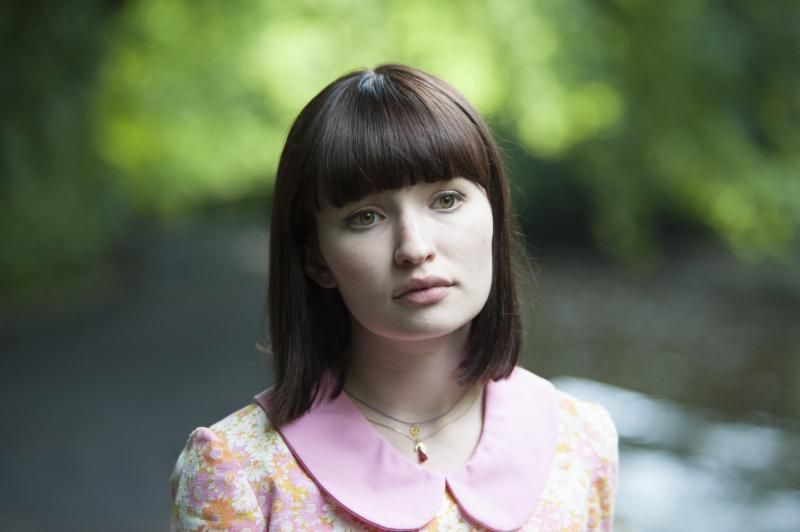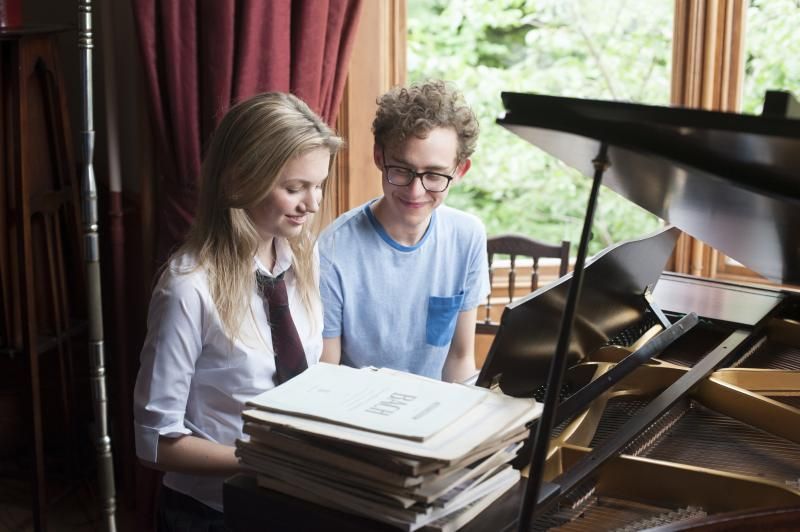Belle & Sebastian frontman Stuart Murdoch has been working to create God Help the Girl for the better part of a decade. The film feels like a culmination of his career in pop culture, the songs perfected, his aesthetic instantly identifiable. However, it’s not the hit he's always wanted.
"I know our band, we do well, but we creep along,” Murdoch told Spinoff Online. “We creep along, but one of these fucking days I want to have a hit record, you know?" But God Help the Girl isn't it, "and that's fine," he said. "I love that, that it's just out there. But, you know, one of these days."
One of these days, indeed. Belle & Sebastian has been cranking out indie-pop songs for nearly 20 years now, but the group hasn't exactly reached Arcade Fire levels of success. However, the band’s dedicated following is as loyal as it gets, and it's those fans who are going to love God Help the Girl. Written and directed by Murdoch, the musical film follows Eve (Emily Browning), James (Olly Alexander) and Cassie (Hannah Murray) as they form a band over the course of a summer in Glasgow, Scotland. These characters — the guitar-playing layabout, the sad girl with a beautiful face, hopeless dreamers and pessimists alike — will feel instantly familiar to fans of Murdoch's work. And the songs, reworked and rerecorded following a tentative 2009 album release, have never sounded better.
With a new Belle & Sebastian album in the works, a reissue of the band's back catalog on vinyl set for October, a short U.S. tour commencing soon, and God Help the Girl and its soundtrack hitting the United States this week, Spinoff spoke with Murdoch about the film, his belief that there's a Seinfeld gag for every situation, and the possibility of another Belle & Sebastian graphic novel.
Spinoff Online: Did God Help the Girl turn out exactly how you imagined it?
Stuart Murdoch: That's a good question. I'd like to think that it's something like how I imagined it, which is probably an achievement. But so many things changed along the way. I think there's an essence in there of what I'd hoped for. I think the way Glasgow looks, I think the way that the 16mil makes the film look — there's a sort of dreaminess to it. I think some of the music's turned out nice. The performances were so relaxed and natural from the three leads. I think probably when I see it in years to come that will just give me so much pleasure. If things were tense or they didn't get it right it would be no good.
You wrote these songs over many years. Was it strange writing for a film you weren't certain you'd actually make?
Well, you're forgetting the arrogance of the artist. When I was making this stuff I completely imagined that the film would get made. I didn't really have that much doubt. But you've got to think that way, because then the thing becomes real. And the more it's real in your head, the more that people actually believe you. I know that sounds like a funny thing, but if you have this craziness it sort of catches on.
Let me just point out that I started writing this quite a while ago, and the songs came along first, and suddenly my creativity was going two different directions. I was still working with Belle & Sebastian, and then I had this new thing that came along. And it was a nice period for me, songwriting-wise — I hadn't had such a good songwriting period since If You're Feeling Sinister, you know, back in the day. I was writing songs for the girl, Eve, and also I was writing songs for The Life Pursuit, which was the record we were about to make. I was going from one to the other, and they felt like they were feeding off each other.
There were a couple of overlaps, though. I wrote "Dress Up in You" for the film, but then it just felt like I wanted to sing it for the present record. I thought, "Yeah, I can sing from a woman's perspective in this. It'll put a nice slant on it." So that ended up on Life Pursuit. And then we were wrestling with the song "Act of the Apostle." Actually, Stevie [Jackson, songwriter and guitarist for Belle & Sebastian and God Help the Girl] started off part one, and I wrote the second part, and I was kind of thinking, "Wow, this is — I'm in Eve territory here. This is kind of an Eve song, but I'll leave it in here." So there was a little bit of cross-pollination.
After listening to the songs in God Help the Girl, and especially after seeing the film, I see parts of Eve in a lot of the other characters you sing about. What is it about Eve that drew you to her?
She was the first proper, three-dimensional character that wouldn't go away. I guess it was just me sort of maturing; I was ready to do that kind of thing. She felt like a proper person. Also I think she was the first person that was really writing the songs for me, whereas the other characters, like Judy and Sukie, they're a little bit more cartoonish, a little bit more based on characters that I see around or something. But Eve was coming from my past. She was coming from a different place, a place of sort of history and disaster. You know, a kind of ghost or something like that. That's where the songs came from.
Do you see a lot of James in yourself as well?
I see a little bit of James, maybe less so, but there's definite strands. James wasn't meant to be such a big character or something like that. It was all meant to be about Eve. But I liked it when he got up on his soapbox and he would talk about music. I kind of like to do that a little bit when I get, for instance, my wife in the car, maybe one of her friends, I'll just, like, yap, yap, yap. I really like to have an audience, you know? And you're kind of showing off to the girls and stuff. And James is a little bit like that. He doesn't get out much, suddenly he's got these two fabulous women around the place, and so he tries to be in good form all the time.
I love when he finally gets to tell his side of the story toward the end of the film.
Yeah, because to an extent he starts off the film and he's a pretty prototypical dweeb, you know? He's a little bit of a twerp, you know? He's kind of working in the swimming pool, he's stuttering and all that stuff, but Olly's performance is great. I think he realized — I didn't really have to explain much to him. He arced his performance himself, which was really tricky, because the thing wasn't filmed in order. But when you see it now he starts off that way — it's irritating to watch — but he becomes a little bit of a rock for Eve. He definitely becomes more likable, hopefully, as the movie goes on.
As a Game of Thrones fan, I love Hannah Murray as Cassie as well.
I'm missing out. I've never seen — I'm always scared to see Hannah in anything else. I never saw — I was going to say Cheers — what was the one she did? Skins. And I never watch Game of Thrones. Does she wear — like, in my mind, and I don't know anything about Game of Thrones — does she wear like a — does she look like a cave woman? Does she wear, like, a bear skin or something like that?
More just rags. She's part of basically the savage people. But she's lovable. She's a bit simple in it.
She's like a waif. [laughing] A bit simple! Oh, that's funny.
So you wrote and directed God Help the Girl, but your personality is all over the film — even the cinematography looks like Belle & Sebastian album covers, which you've photographed yourself.
I really didn't have to do much. I was thinking that. I love Seinfeld. There's a Seinfeld clip for every occasion. He starts off one of the shows, he's going, "You know, I like music, but I don't really understand, why do we need a conductor? You know, in the orchestra, I can see them starting the thing off, but once you're going, you know, surely you'd just go and sit down?" [laughing] And to an extent, I'd been working on the script for so long, once I got things going, you know, the great people that I was working with, they got it. I never had to give the costume designer many notes, because she knew me from the '80s, '90s and stuff. She knew what the deal was. She knew how to dress everybody. So that was no problem.
Then Giles [Nuttgens], the cinematographer, very quickly got what we were doing. We had to shoot super-fast, you know, we used film, and film has limitations, but then there's a beauty in the simplicity about it. We didn't use many lights, because we were outside a lot of time in Glasgow and we had to move really fast. So really all these things were kind of being dictated to us. I knew that it would end up looking like a Belle & Sebastian record sleeve, because we were using 16mil, we were in Glasgow, we were outside, and we were shooting where I like to see. It's a no-brainer.
What was the hardest part of the whole years-long process?
Certainly just principal photography. There were five weeks of shooting. It was hard, you know. I was worried about the stamina. Sometimes I would get so tired I couldn't really speak properly. But that was hard, but great at the same time. There's been a few machinations since the film's been made, you know, a few, like, crazy sort of tough things. You know when you have to grow up a little bit, where you have to do business, you really have to fight for the film, fight to get the film out, you're fighting to get it the way you see it and fighting to get it into the cinemas and stuff like that. That's been a bit of a battle sometimes, but I think we're getting there.
Obviously it was an idea that took shape in your head over a long period of time, so what pushed you to go from "I hope to do this someday" to "I'm doing this right now, it's happening"?
I mean, the vision was always driving me. I got to the point where I'd actually made the record, and I could have stopped there. I could have stopped because I was tired, the band were getting busy again, and I'd just got married, and all that stuff was happening. And, do you know, the record came out, and nobody bought it. Hardly anybody bought the actual record. And I thought maybe it could have given me a little bit of a boost [if it had sold well], but hardly anybody bought the record. And I was thinking, "Come on, after all it is, like, a conceptual LP, there's no band here, what do you expect?" And it was at that minute that I thought, "I've got to make the film." It redoubled my effort. I thought, "What do you expect? You've got this concept, you can't stop here. You have to make the film. You've got to prove it to them."
Do you feel that you have?
I think we've done OK. Whatever happens now, I'm pretty happy.
Have you proved it to yourself?
I'm not too bothered about that, you know, because you're around yourself all the time. You don't have to second-guess yourself. But we did it, we got the film out, and we got it in good shape. Barry [Mendel, producer] is really pleased with it. He's like, you know, "We'll look back on this in ten years, and we did our job." We were just talking about it last night, because he's in L.A.
But secretly, I can't help — I'm like a pop guy. I'm always striving. My wife gets on to me, she says, "But the film's out and it's great!" And I'm like, "Yeah, but all the things I love, most of them are, like, popular successes." You know? Kill me if one of these times I want something that I'm involved in to be a popular success. I know our band, we do well, but we creep along. We creep along, but one of these fucking days I want to have a hit record, you know? Because the bands I love all had hit records, and the films that I love are all mostly hits, you know, there were some films that were classic sleepers. But this film is not going to be a hit. This film is just going to creep into the — and that's fine. I love that, that it's just out there. But, you know, one of these days [laughing].
You've worked on so many projects, and one of my favorites is the 2006 graphic novel Put the Book Back on the Shelf. Have you considered doing any more work in that space?
It's funny you should ask that. I mean, I had very little to do with that. I just remember saying, "You guys go ahead. I'll be interested to see it." But Graham Samuels, who did the illustrations on the original record of God Help the Girl and on the website, we were actually working on a graphic novel for a while there of what happened to Eve before the film. We thought it would be a nice little side project, because there was all that stuff, you know, how did she get into such sad shape? And he did some pages for me, and he just draws great. I find it really exciting. But it just got, you know, put by. It's very time-consuming. He didn't have the time. But maybe we should resurrect that.
God Help the Girl arrives Friday in select U.S. theaters and on Vimeo on demand.




